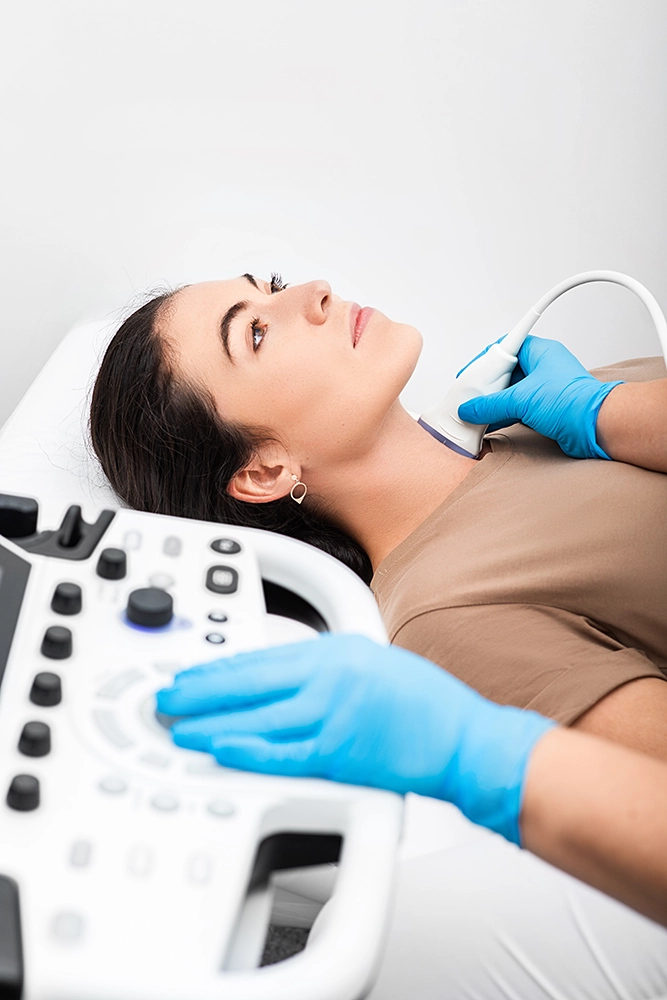Thyroid Hormone Therapy
Orange County, California
Closely Replicating Normal Thyroid Functioning.
Thyroid Hormone Therapy — What It Is & Why It Matters
Your thyroid is a small, butterfly-shaped gland low in the front of your neck. Despite its modest size, it plays a significant role: it produces hormones (mainly T4 and T3) that regulate how your body uses energy — affecting metabolism, temperature, heart rate, digestion, muscle strength, mood, and more. When your thyroid doesn’t work correctly, hormone levels can fall too low (hypothyroidism) or sometimes become too high (hyperthyroidism), disrupting how your whole body functions.
Thyroid hormone therapy steps in to restore balance: by giving synthetic thyroid hormone, we can bring your hormone levels back into a healthy range — helping your body run more like it should.
Who Needs Thyroid Hormone Therapy
Common situations where therapy may be recommended include:
- Underactive thyroid (hypothyroidism): When your thyroid doesn’t make enough hormone — often causing fatigue, weight gain, cold sensitivity, dry skin or hair, and sluggishness.
- After thyroid removal or destruction: If part or all of your thyroid is removed surgically (for benign nodules, cancer, or other thyroid disease), or destroyed (for example, by radioactive iodine), your body can no longer produce enough hormone on its own — so replacement is essential.
- Thyroid cancer management (suppression therapy): In cases of thyroid cancer, higher-than-normal doses of thyroid hormone may be used to suppress thyroid-stimulating hormone (TSH), because TSH can encourage growth of residual thyroid or tumor cells — helping reduce the risk of recurrence.
How Therapy Works — What to Expect
- Medication: The most common treatment is a synthetic hormone called levothyroxine (T4). It mimics the natural T4 your thyroid would produce.
- Individualized dosing: Your provider determines your dosage based on factors like your weight, age, overall health, and lab results.
- Regular monitoring: After starting therapy, you’ll have lab tests (usually including TSH and free T4, sometimes free T3) to ensure your levels are within the optimal range. Your dose may be adjusted over time if needed.
- How to take it: Because absorption can be affected by food, calcium, iron, or other supplements/medications, it’s often recommended to take thyroid hormone on an empty stomach — typically first thing in the morning, or at bedtime (at least 3 hours after eating).
- Consistency matters: It’s essential to take the dose the same way every day — at the same time, under the same conditions — and stick with regular checkups, even if you already feel better.
What Therapy Can Do for You
When properly managed, thyroid hormone therapy can:
- Restore energy levels, reduce fatigue, and improve mood
- Normalize metabolism, supporting healthy weight and digestion
- Help regulate body temperature, heart rate, muscle strength, and cognitive function
- Prevent long-term complications of untreated thyroid disease — from heart problems to bone issues or metabolic disruption.
In thyroid-cancer-related cases, therapy can also serve a protective role — reducing risk of recurrence by keeping TSH low so that any remaining thyroid cells are less stimulated to grow.
Responsibilities & What’s Expected of You
- Take medication consistently — same dose, same time each day
- Keep follow-up appointments — lab testing and checkups are essential, even if you feel “fine.”
- Let your doctor know about any new medications, supplements (calcium, iron, antacids), pregnancy, or significant health changes — these can affect how thyroid hormone works in your system.
- Never stop suddenly — thyroid hormone therapy is usually lifelong; stopping abruptly can cause your symptoms to return.
How We Approach Thyroid Care at OC Sports & Wellness
At OC Sports and Wellness, under the care of Dr. Sunshine, thyroid hormone therapy is part of a comprehensive — and personalized — approach to thyroid health. We don’t just treat lab numbers; we look at the whole person. That means:
- Careful diagnostic evaluation (history, labs including TSH, free T4, free T3, thyroid antibodies, imaging if needed)
- Customized treatment plans depending on thyroid condition — whether it’s hypothyroidism, thyroiditis, post-surgical care, or thyroid cancer management.
- Ongoing monitoring and adjustments (medications, follow-ups) to ensure optimal hormone balance and overall health.
- A holistic view: because thyroid health influences metabolism, energy, mood, and physical performance — essential for active patients, athletes, or anyone wanting to feel their best.
What You Should Know Before Starting Therapy
- It may take several weeks of daily medication before you begin to feel better — because your body needs time to rebalance.
- The dose may change over time — as you age, gain or lose weight, start new medications, or experience other health changes.
- Especially if your thyroid was removed or treated for cancer, therapy might not only replace hormone — it might also help prevent growth of leftover thyroid tissue.
- You may need to coordinate with other aspects of care (medications, supplements, diet, lifestyle) — because many factors can influence absorption and hormone balance.

